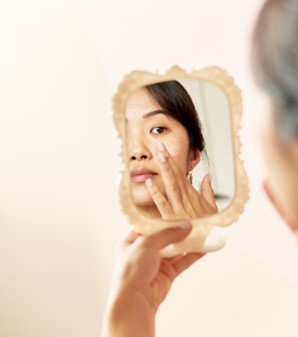Paulette Padilla works as an Advanced Practice Registered Nurse specializing in the field of anti-aging and weight loss treatments and is a leader in non-surgical aesthetic procedures. In the following article, Paulette Padilla highlights the connection between stress and skin health, delving into how it affects your skin, providing tips for managing mental fatigue to maintain a clear and healthy complexion.
Stress is an unavoidable part of life, but did you know it can have a significant impact on your outward appearance? Whether it’s a work deadline, financial worries, or personal relationships, it can manifest in various physical symptoms, and one of the most visible signs can be changes to your complexion.
Paulette Padilla Explains the Stress-Skin Connection
Stress triggers a complex response in the body, releasing hormones like cortisol and adrenaline, designed to prepare you for “fight or flight.” While this response can be beneficial in short bursts, chronic worry leads to prolonged exposure to these hormones, which can negatively impact your body, including your skin.
Cortisol: The Stress Hormone
Cortisol is a key player in the stress response. When it persists, elevated cortisol levels can disrupt various bodily functions, including those related to skin health:
- Increased Oil Production: Cortisol stimulates oil glands, leading to excess sebum production. This can cause clogged pores, which are a breeding ground for acne.
- Reduced Skin Repair: High cortisol levels can slow down the skin’s ability to repair itself, leading to a slower healing process for blemishes, cuts, and other issues.
- Collagen Breakdown: Collagen is essential for maintaining elasticity and firmness. Cortisol can break down collagen, leading to premature aging, wrinkles, and sagging skin.
Stress-Related Skin Conditions
Chronic worry can exacerbate existing skin conditions and even trigger new ones. Paulette Padilla highlights some common stress-related concerns:
- Acne: As mentioned, cortisol can lead to increased oil production, which contributes to acne breakouts. It can also disrupt gut health, which in turn can affect the complexion.
- Eczema and Psoriasis: These inflammatory skin conditions can flare up or worsen under stress, leading to redness, itching, and discomfort.
- Rosacea: It can trigger rosacea flare-ups, causing redness and visible blood vessels on the face.
- Hives: High levels of stress can lead to the release of histamine, causing hives or urticaria.
Tips for Managing Symptoms and Protecting Your Skin
Managing your mental health effectively is crucial not only for your overall well-being but also for maintaining a healthy glow. Paulette Padilla discusses several strategies to help reduce emotional overload and protect your complexion:
Practice Relaxation Techniques
Incorporate relaxation techniques into your daily routine. Activities like deep breathing exercises, meditation, and yoga can help calm your mind and body, reducing cortisol production and its impact on your skin.
Exercise Regularly
Regular physical activity is an excellent way to combat sluggishness and increase a positive mental outlook. Exercise releases endorphins, which are natural mood boosters. Additionally, exercise improves circulation, which can benefit your overall appearance.
Prioritize Sleep
Sleep is crucial for mental health management and skin health. Aim for 7-9 hours of quality sleep each night. Sleep allows your body and mind to repair and rejuvenate, and it helps regulate cortisol levels. Consider creating a bedtime routine to improve sleep quality.
Maintain a Healthy Diet
Your diet plays a role in managing stress and promoting skin health. Focus on a balanced diet rich in fruits, vegetables, whole grains, and lean proteins. Paulette Padilla suggests avoiding excessive caffeine and sugar, as they can disrupt sleep.

Stay Hydrated
Proper hydration is essential for overall wellness. Drink plenty of water throughout the day to keep your skin hydrated and flush out toxins. Dehydration can make mental fatigue worse and contribute to dry, flaky skin.
Establish a Skincare Routine
A consistent skincare routine can help you manage complexion issues. Use gentle cleansers and moisturizers to keep your skin clean and hydrated. Avoid harsh products that can irritate the skin, especially when it’s already inflamed. Consider incorporating products with anti-inflammatory ingredients like aloe vera, chamomile, and niacinamide to soothe irritated skin.
Seek Professional Help
Paulette Padilla explains that if issues persist or worsen, it may be helpful to consult with a dermatologist, general practitioner or mental health professional. A dermatologist can provide targeted treatment for specific conditions, while a therapist can help you develop coping strategies for managing psychological overload.
Conclusion
Stress is an unavoidable part of life, but its impact on your skin health can be managed with the right approach. Understanding how it affects your complexion is the first step in taking control of your skin’s health. By practicing relaxation techniques, prioritizing sleep, maintaining a healthy diet, and establishing a consistent skincare routine, you can reduce the impact on your skin and maintain a clear, healthy complexion.
Remember, mental health management is a journey, and it’s essential to find the strategies that work best for you. If you’re struggling with chronic anxiety, depression, or severe skin issues, don’t hesitate to seek professional guidance. With patience and persistence, you can achieve both a calmer mind and healthier glow, inside and out.









